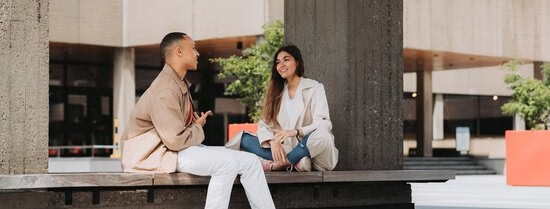The Erasmus School of History, Culture and Communication (ESHCC) is an interdisciplinary faculty within Erasmus University Rotterdam, comprising the departments of History, Arts and Culture Studies, and Media and Communication.
Who we are
ESHCC's mission is to make a positive social impact through high-quality education and groundbreaking academic research. In doing so, we bridge the gap between the humanities and social sciences and explore the complex and dynamic relationships between culture, media, communication, society, economics and history.
Our goal is to educate a new generation of engaged global citizens, equipped with the analytical tools, openness and entrepreneurial mindset needed to navigate an increasingly complex world. In addition, we aim to be a globally recognised institute that supports the development of resilient, inclusive and future-oriented societies by promoting scientific insight and stimulating collaboration between disciplines.
We do this based on our core values of global citizenship, social engagement, community spirit, creativity and entrepreneurial thinking, and inclusivity and responsibility, which are based on the Erasmian values of Erasmus University Rotterdam.
Our departments
History
Understanding today's world by studying the past.
Arts and Culture
Studying arts and culture from multiple angles
Media & Communication
Explore the broad and dynamic field of media and communication.
Our education
At ESHCC, we aim to create lasting societal impact through high-quality interdisciplinary education. We strive to achieve tangible societal impact by advancing innovative, student-centred educational approaches that encourage interdisciplinary learning across faculties and departments. This way we ensure our students are well-prepared to address important societal challenges. We will continue to foster interactive pedagogies and assessment methods, to strengthen our international classroom, as well as our commitment to small-scale, personal learning environments that promote deep engagement and a sense of belonging. The faculty offers three distinct Bachelor programmes and various master programmes, divided into several specialisations.
Our research
The faculty’s research institute, the Erasmus Research Institute for Media, Culture, History and Society (ERMeCHS), brings together scholars conducting high-impact, interdisciplinary research at the crossroads of media, communication, culture, the arts, history, and society. Our work advances critical understanding of the cultural and historical dimensions of globalisation, and the evolving role of media in shaping contemporary societies. Themes of diversity and inclusion are also central to our research agenda, as we address urgent societal challenges such as citizenship, racism, migration, and inequality from both historical and contemporary perspectives.
Furthermore, our researchers participate in several national research schools:
Huizinga Institute – the Dutch National Research School for Cultural History
Netherlands Institute for Cultural Analysis (NICA)
Netherlands Interuniversity School for Islamic Studies (NISIS)
Netherlands Research School of Gender Studies (NOG)
Research School for Media Studies (RMeS)
Research School Political History (RSPH)
Netherlands School of Communication Research (NESCOR)
Posthumus Institute – Research School for Economic and Social History.
Our students (2024-2025)
1613 Bachelor students
601 Master students
135 Pre-master students
2378 students in total
47.5% Dutch, 37,5% EEA, 15% non-EEA
Our staff (2025)
13 professors
127 associate professors, assistant professors and lecturers
13 researchers
35 PhD students
51 Professional Services Staff members
239 staff in total
